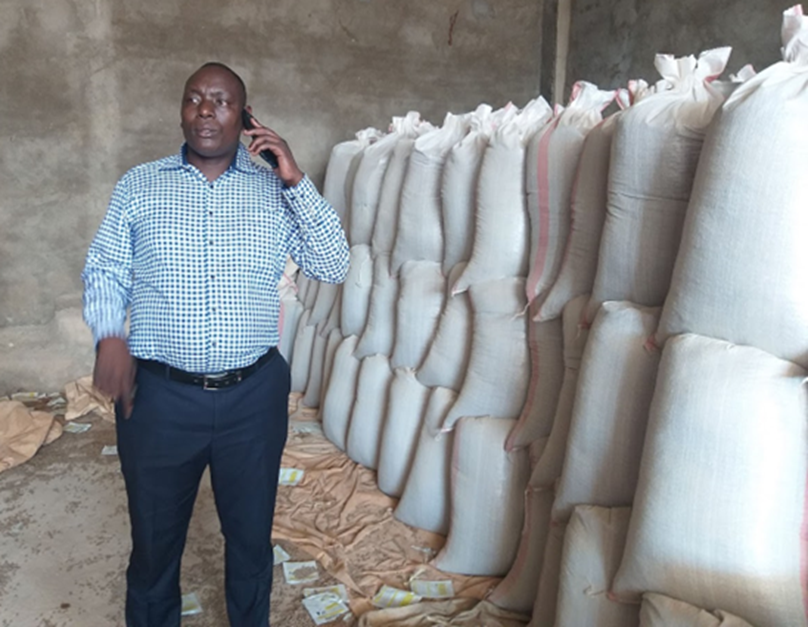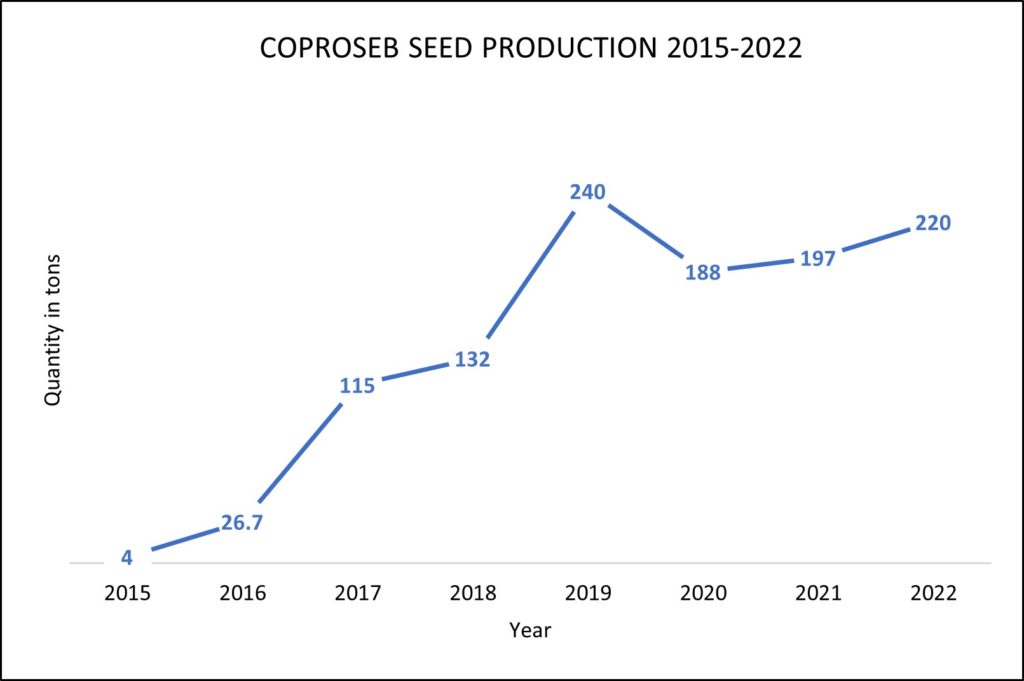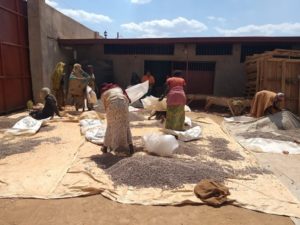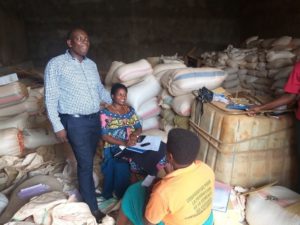By Authors: Sylvia Kalemera, Blaise Ndabashinze and Eric Nduwarugira, Astere Bararyenya, Patricia Onyango, Owen Kimani and Jean Claude Rubyogo
Mr. Leonidas Nimpagaritse, is a hardworking man. He is a common bean seed producer based in Gitega province in Burundi. Before he started farming, he was a truck driver and the owner of a carpentry shop in Rutana province.
In 2015, he started a community-based organisation, COPROSEB Nyunganira an agricultural venture that planted irish potatoes, maize and wheat in Mwaro Province. In the following year, he was approached by Institut des Sciences Agronomiques du Burundi (ISABU) bean program who encouraged him to add common beans in their crop portfolio.
At first, he was skeptical about bean adaptability in Mwaro Province where the group was based. Further interactions with ISABU and practical demonstration on how well beans were adaptable in Gisozi research station located in the same region. Leonidas was trained on bean seed multiplication by ISABU. From the training, he was given a small quantity of improved bean seed to plant and compare their yield and performance with their local varieties. From the harvest of the two varieties, results showed that the improved seed yielded better than the local. This was proof enough to start growing the beans and in the following season, Leonidas requested the Office National de Contrôle et de Certification des Semences (ONCCS) to register the group as seed producer for both foundation and certified seed. COPROSEB’s business plan on seed production involves both direct engagement in seed multiplication and contracting farmers to meet the demand. On contract, they provide basic seed and fertilizers to the producers at planting time, and offset production cost through seed exchange after harvest.
In the beginning, the group started with four varieties and later added seven to make a total of eleven. These varieties are; Musole, Kinure, Mukungungu, Magogori, Rufutamadeni, Kaneza, Musengo, Mutwenzi, Murwiza, Inamunihire and Muhoro.
Certified seed production trend
There has been an upward trend since they started seed production from 4 in 2015 to 220 tons by August 2022 (see graph 1). Main buyers of these seed are development organizations such as IFAD, World Vision International, PACSC, Concern International, Send a Cow, FAO, other seed sellers, and cooperatives. To increase seed access to farmers, the seed are packed in different sizes of 5kg, 10kg, 25kg and 50kg. The small size pack are affordable especially for smallholder farmers.
With the bean business growth, COPROSEB used part of their savings to construct a warehouse. Half of the construction money came from the group’s savings. The store employs 100 (80% women) temporary and four permanent employees (3 men and 1 woman) to sort the beans. The bean sorting brings income to the women who are the majority at the store (see photo 2). To increase their investment, the group purchased a tractor to cultivate their farm and hire out to other neighboring farmers. The beans seed business has opened an opportunity for expansion for other businesses and strengthen investments in other crops such as maize and irish potatoes. The demand for certified seed has also driven the need to purchase more land, they have purchased 30 ha. farm in Shombo commune from Karusi Province and are growing more beans and maize. Furthermore, they have bought two double cabin vehicles and built a four storeyed building which will have offices on the ground floor and the and 44 roomed hotel to the rest.
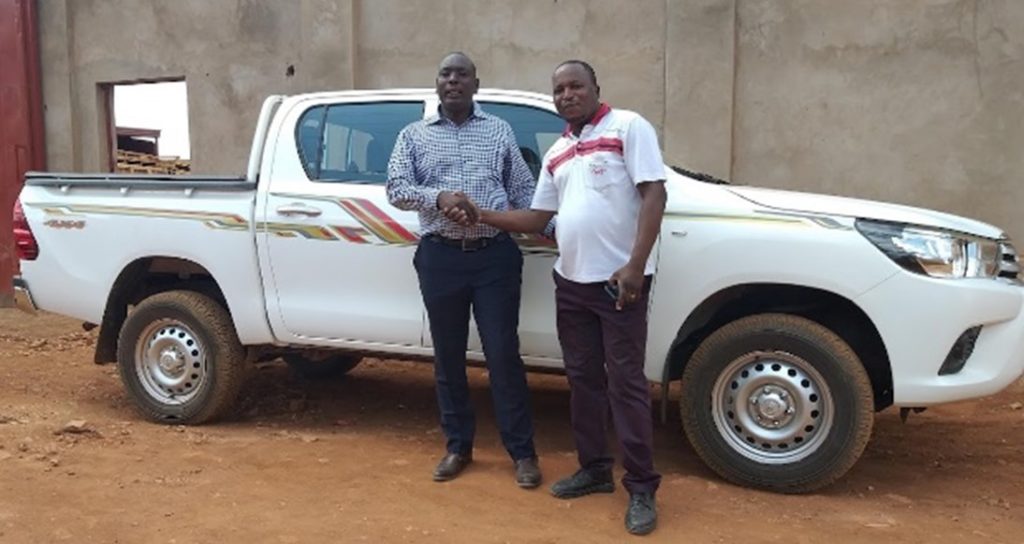
Leonidas(L) with Mr. Eric Nduwarugira (R)-ISABU, standing next to one of COPROSEB’ vehicle bought from bean seed income.
Bean business is also attracting some new clients, Leonidas added. ”We occasionally sell bean grains depending on the demand. For example, in 2019, we sold 400 tons of bean grain to the military.”
Leonidas recognizes the importance of engaging his family in the business. He works with his wife at the store. She does bookkeeping of the business (see photo 4). Leonida’s appreciates the importance of education because he had limited schooling, But this did not deter him from opening up his businesses and working hard to take is children to school. “ I want better education for my children because I didn’t have much. I have my two children furthering their studies with money from the business.”
Leonidas attributes COPROSEB’S success to ISABU for introducing them to higher yield and short duration bean varieties and offered strategic trainings. The trainings on seed production and seed business management contributed greatly to growth of the seed businesses and subsequent investments.
Climate change leading to changes to weather patterns leading to interference on the planting and harvesting periods are some of the challenges Leonidas face. This is the main challenge that has pushed him to diversify his investments portfolio to minimize risks.
The future is promising. “I am planning on constructing a bean canning factory on the 30 ha. land we bought. Also, expanding the bean varieties from consumer demand angle for the canned beans.” He shared. The target for the canned beans are middle income and urban dwellers who need quick fix meals. The canned beans will not only save cooking time but also reduce charcoal use which is expensive and at the same time preserve trees. COPROSEB is exploring contract to supply beans to the police and military.

